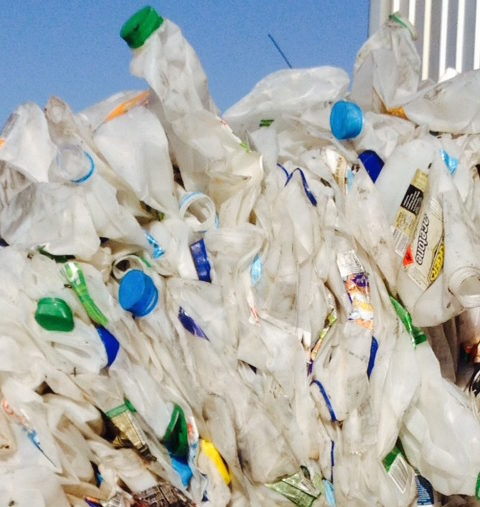contamination is a big issue- rope, gas bottles and even nappies
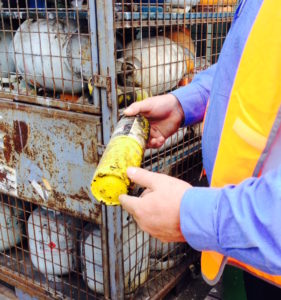
A Recycling Facility is commonly called a Materials Recovery Facility or MRF, most people know this is where the yellow top bin goes. There are many different types of MRF, the ones generally used in Perth for the yellow top recycle bin are set up to sort paper, cardboard, plastics, glass, aluminium cans and foil and tin cans.
They can be owned and run by councils such as Southern Metropolitan Regional Council. See a virtual tour of the facility in Canningvale http://smrc.com.au/virtual-tours/
Or they can be run privately by corporations such as Cleanaway or Suez. (Although the Cleanaway facility was burned down in November 2019 the rebuild is expected to be completed in 2021). Note both these businesses are Australia wide and some of the information on their websites about the destination of certain materials may not apply in Perth.
Council trucks or the recycler will pick up and deliver the bins to the MRF. The material is first checked on a very fast conveyor for the obvious contaminants such as rope and gas bottles.
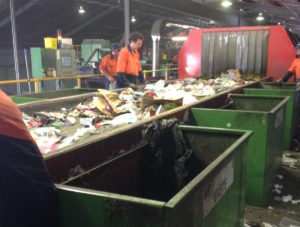
fast moving conveyors mean speedy first manual check.
Various separations occur mechanically until all materials are separated including the plastics into PET (polyethylene terephthalate) and HDPE (high density polyethylene) and mixed plastic (everything else). MRF facilities in Perth do not cope with plastic bags and other soft plastics, as there is no market for them and they can interrupt the sorting procedure if there are big pieces.
A better option for ‘soft and noisy’ plastic (bags, chip packets, pasta packets etc) is to take them back to Coles or Woolworths. There is a green bin at the front of the check-out that will list all the types taken. This is then collected by a local recycler and sent to Melbourne through the REDcycle program to a plastics processor Replas. Although the ‘travel miles’ for the material is similar to other plastics in Asian markets, the recycling process will have particular standards that must be adhered to in Australia, not able to be guaranteed elsewhere. Also the product may be donated to local schools.
A critical issue for goods from Replas, is the market for their products. As they are made from plastic, they are durable, meaning posts and seats do not need to be replaced so often, limiting markets. THe big message is always reduction.
Each recycling business will be searching for the best market. One recycler has monthly tenders going out for their goods. The best markets for ferrous metals will be Asia, India for aluminium, steel cans Japan are currently good options.
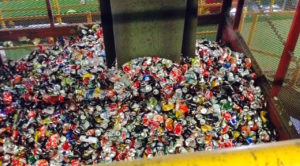
Aluminium cans and foil will be baled and exported.
Paper and cardboard is usually sent to China as there are no longer any reprocessing facilities for it in WA. However the contamination must be less than 0.5% (one nappy in a bale of cardboard). Since China introduced a National Sword policy in 2018 the markets have been moved to other Asian locations where the material is cleaned and brought to a standard China will accept. More recently countries such as Malaysia, India, Vietnam and others have started to send back contaminated recycling to the countries of origin.
Australia has been prompted to look at recycling options on shore. The first task will be to produce materials clean and streamed enough for manufacturing countries to accept. Currently it is unlikely Australia will have the manufacturing economic viability to produce goods cheap enough to compete on imports.
Glass is coming from the yellow top bin will at best be crushed and mixed in road base in WA. No recycler wants to risk sending a truck load of heavy glass to SA (main recycling destination for glass) to have it rejected from having contamination of the wrong type of glass in the load.
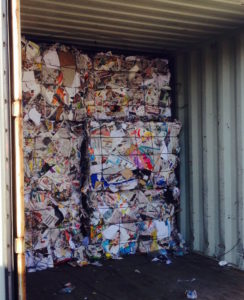
Paper baled ready for China
So does it actually get recycled? We need to remember- can it be recycled is different to will it be recycled? Recycling is a business and a market needs to be found for materials collected. How people present the goods in the bin is an important part of giving the recycler the best chance to ind a market.
The materials must always be placed loose in the bins, staff do not have time to open bags. Materials should be separated such as metal lids off jars, plastic wrap off newspapers, and just to improve the recycling value, take the lids off plastic bottles. Recyclers don’t want them they are too small for the automated process.
Clean it! There are real people working in the facility and also imagine what a milk bottle smells like after a month in a sea container.
The real message for residents is to put less in their recycling bin. As soon as we drop it in the bin, it is costing money, to pick up, sort, pack, send on and reprocess.


